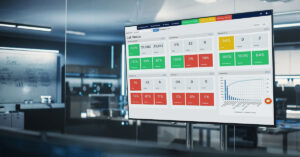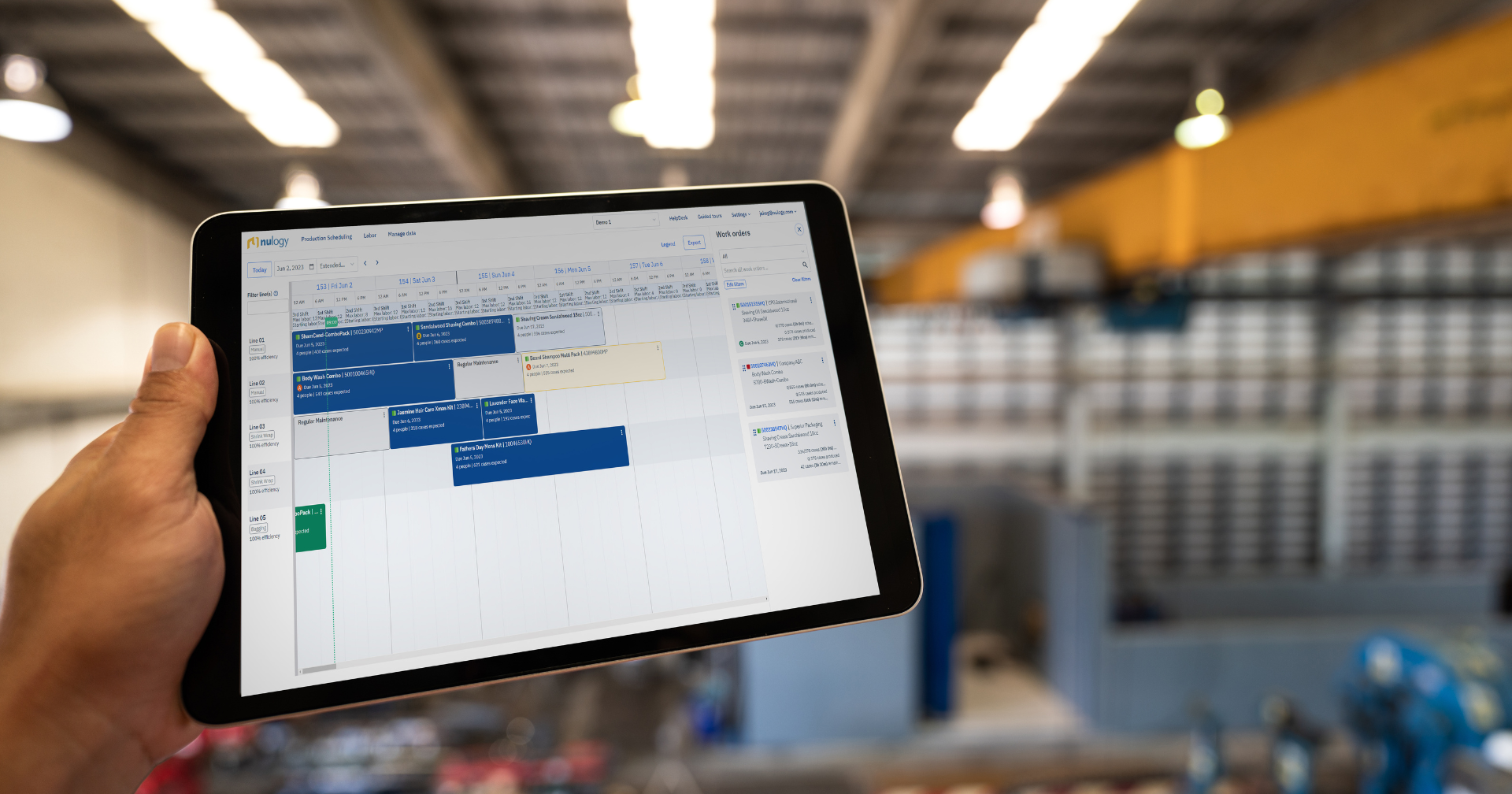El software MES es una potente herramienta para optimizar los procesos de producción e impulsar la eficiencia en las operaciones de fabricación. Sin embargo, el software MES se queda corto cuando se trata de proporcionar visibilidad en la planta de producción para fabricantes discretos.
Las limitaciones de MES para fabricantes discretos
- Complejidad de los procesos de producción: La fabricación discreta implica producir una amplia gama de productos con distintas configuraciones, especificaciones y requisitos de producción. El software MES tiene dificultades para proporcionar visibilidad en tiempo real de la complejidad de estos procesos. Esto dificulta el seguimiento y la gestión eficaz de las actividades de producción. Asimismo, lo que su planta está fabricando hoy no va a ser lo mismo que mañana cuando se ajuste a los pedidos de los clientes. Se necesita un cuadro de mandos de fabricación para obtener esos datos en tiempo real en un formato que los responsables de la planta puedan entender.
- Granularidad limitada: El software MES a menudo carece de la granularidad necesaria para capturar información detallada sobre unidades de producción, materiales y componentes individuales en un entorno de fabricación altamente dinámico. Esto limita la capacidad de supervisar y optimizar los procesos de producción a nivel granular. Se centran en la imagen general de lo que debería estar ocurriendo en la fábrica ese día. No la visibilidad minuto a minuto de lo que ocurre en cada línea.
- Inflexibilidad: Muchos sistemas de software MES están diseñados para entornos de fabricación tradicionales y repetitivos en los que los procesos de producción son rígidos y están estandarizados. Piense en una planta de procesos que crea el mismo producto una y otra vez. Los fabricantes discretos operan en entornos de producción dinámicos y flexibles. Esto les obliga a disponer de sistemas adaptables capaces de gestionar una amplia gama de variaciones de productos y escenarios de producción. Una fábrica de pilas va a fabricar algo más que AA. Dependiendo del día y de la demanda, puede haber una docena de modelos diferentes en producción.
Finalidad y ventajas del software MES
- Automatización de procesos: El software MES automatiza y agiliza los procesos de fabricación. Esto incluye el procesamiento de pedidos, la programación, el seguimiento de la producción, el control de calidad, la mejora de la eficiencia operativa y la reducción de las intervenciones manuales.
- Optimización de recursos: El software MES optimiza la utilización de los recursos mediante la coordinación de las actividades de producción. Esto permite a los fabricantes asignar los recursos de forma eficaz y minimizar los tiempos de inactividad mediante una programación proactiva del mantenimiento y la supervisión en tiempo real.
- Garantía de calidad: El software MES garantiza la calidad del producto y el cumplimiento de las normas reglamentarias. La calidad se consigue implantando sólidas medidas de control, realizando un seguimiento de las variables de producción y proporcionando trazabilidad a lo largo de todo el proceso de fabricación.
Puntos fuertes de MES en sistemas de producción rígidos
Mientras tanto, un área en la que el software MES sí destaca es en los entornos en los que los procesos de producción son rígidos y repetitivos. Estos entornos incluyen:
- Producción de gran volumen: El software MES es idóneo para gestionar la producción de grandes volúmenes de productos estandarizados con especificaciones y requisitos de producción coherentes. Piense en una fábrica de lejía. Cada paso del proceso de fabricación de lejía está regulado y puede seguirse. La única variación en el producto final es el tamaño del recipiente en el que se vierte la lejía.
- Flujos de trabajo predecibles: En entornos con flujos de trabajo predecibles y pasos de proceso bien definidos, el software MES automatiza las tareas, impone procedimientos operativos estándar y minimiza la variabilidad en los procesos de producción. En esta planta hipotética, cada turno entra sabiendo exactamente en qué va a trabajar porque rara vez cambia.
- Fabricación por lotes: El software MES es eficaz en entornos de fabricación por lotes en los que los productos se fabrican en cantidades predefinidas con parámetros de procesamiento y recetas coherentes. Por ejemplo, un envío que siempre requiere 100 cajas tendrá un proceso predecible con una disponibilidad preestablecida y un rendimiento planificado.
Puntos débiles del software MES para el seguimiento de sistemas de producción flexibles
A pesar de sus puntos fuertes, el software MES tiene dificultades para adaptarse a los cambios diarios que se producen en las líneas de fabricación discreta.
- Variabilidad en la producción: La fabricación discreta implica la producción de una amplia gama de productos con diferentes especificaciones, configuraciones y requisitos de producción. El software MES tiene dificultades para adaptarse a la naturaleza dinámica de estos entornos de producción y puede carecer de la flexibilidad necesaria para adaptarse a cambios rápidos en los programas de producción o en las configuraciones de los productos.
- Complejidad de las operaciones: La complejidad de las operaciones de fabricación discreta, incluidas las listas de materiales de varios niveles, los complejos requisitos de enrutamiento y secuenciación, y los cambios frecuentes, plantean retos para el software MES a la hora de proporcionar visibilidad y control en tiempo real sobre los procesos de producción.
- Escalabilidad limitada: El software MES se enfrentará a problemas de escalabilidad cuando se implante en entornos de producción flexibles con una gran variabilidad de productos y cambios frecuentes. Aumentar o reducir la escala para adaptarse a los cambios en el volumen de producción o la mezcla de productos puede requerir una personalización y reconfiguración significativas del software MES.
Por qué los fabricantes de productos discretos necesitan un sistema de control de la producción
Para superar las limitaciones del software MES y lograr visibilidad en tiempo real en la planta de producción, los fabricantes discretos necesitan un sistema de supervisión de la producción dedicado. He aquí algunas razones generales por las que necesita un sistema de supervisión de la producción como Nulogy Smart Factory:
- Visibilidad granular: Los sistemas de supervisión de la producción proporcionan visibilidad del proceso de producción. Capturan datos en tiempo real sobre el rendimiento de los equipos, las métricas de producción y las puntuaciones OEE a nivel de unidad individual o componente.
- Adaptabilidad: Los sistemas de supervisión de la producción están diseñados para adaptarse a la naturaleza dinámica de los entornos de fabricación discreta. Son lo bastante flexibles para adaptarse a los cambios en los programas de producción, las configuraciones de los productos y los parámetros de los procesos en tiempo real.
- Escalabilidad: Los sistemas de supervisión de la producción ofrecen escalabilidad para respaldar operaciones de fabricación en crecimiento. Sirven tanto para instalaciones de producción a pequeña escala como para empresas con varias sedes, sin comprometer el rendimiento ni la funcionalidad.
- Análisis e información: Los sistemas de supervisión de la producción utilizan algoritmos avanzados de análisis y aprendizaje automático. Esto les permite analizar los datos de producción, identificar tendencias, patrones y anomalías, y proporcionar información procesable. Los análisis de fabricación pueden marcarse en el cuadro de mandos, visualizarse en un marcador desde la fábrica o enviarse automáticamente como alerta móvil.
Optimice su proceso de producción con la supervisión de la producción
Aunque el software MES ofrece valiosas capacidades para optimizar los procesos de producción en la fabricación, a menudo se queda corto a la hora de proporcionar visibilidad en tiempo real en la planta de producción para los fabricantes de productos discretos. La naturaleza dinámica y flexible de las operaciones de fabricación discreta requiere un sistema de supervisión de la producción específico. Un sistema que pueda adaptarse a los cambiantes requisitos de producción, capturar datos y proporcionar información procesable para impulsar la eficiencia y la mejora continua. Los fabricantes de productos discretos pueden superar las limitaciones de los sistemas MES y alcanzar la excelencia operativa con el sistema de supervisión de la producción adecuado.







